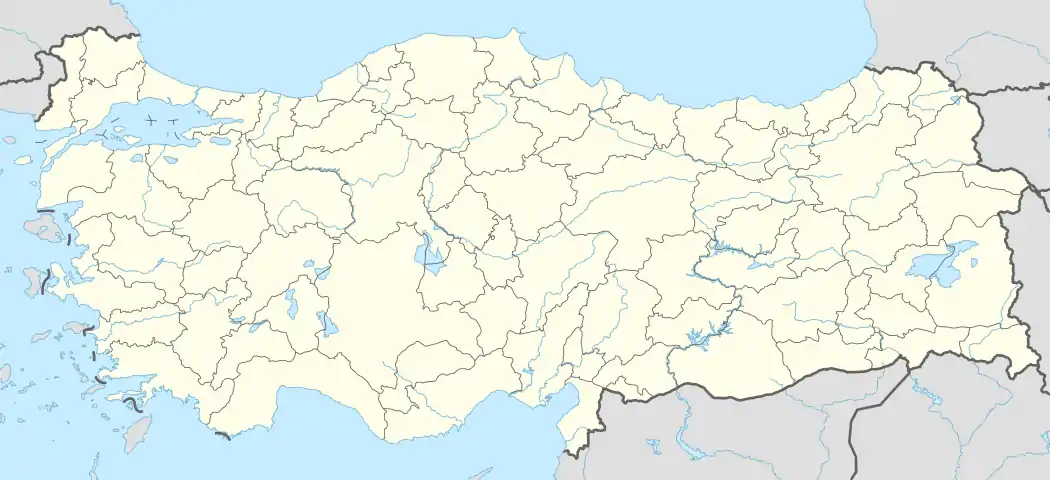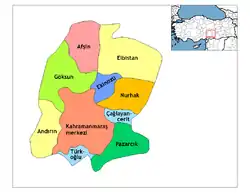Elbistan
Elbistan (Kurdish: Elbistan,[3] Arabic: البستان[4]) is a district in Kahramanmaraş Province in southern Turkey. Its population is 142,548 (2019)[5] and it is the most populous district of Kahramanmaraş province. It is also the largest district of the province by area and it has the fourth largest plain in the country. The district is largely home to a Sunni Turkish and Alevi Kurdish population, but few Sunni Kurdish villages also exist.[6][7]
Elbistan | |
|---|---|
 | |
 Elbistan | |
| Coordinates: 38°12′05″N 37°11′18″E | |
| Country | Turkey |
| Province | Kahramanmaraş |
| Government | |
| • Mayor | Mehmet Gürbüz (AKP) |
| • Kaymakam | Özkan Demir |
| Area | |
| • District | 2,319.08 km2 (895.40 sq mi) |
| Elevation | 1,150 m (3,770 ft) |
| Population (2012)[2] | 143,000 |
| • 2013Population | 139,855 |
| • 2013Population density | 60/km2 (160/sq mi) |
| Post code | 46300 |
| Website | www.elbistan.bel.tr |
History
Evliya Çelebi's Seyahatnâme gives information about the region that in the mountains and towns mostly reside Turkmens who originally migrated from Bukhara.[8]
The city used to be the capital city of the Dulkadirids after capturing from Eretnids in 1337. In 1277 the Mamluks led by Sultan Baibars defeated a Mongol army in the Battle of Elbistan. The region was incorporated into the Ottoman Empire shortly before the campaign against the Mameluks of Egypt in 1512, although some local chiefdoms were given varying degrees of autonomy, notably around the localities of Haticepınar and Kasanlı.
Etymology
The name "Elbistan" was pronounced similarly in Byzantine and Islamic sources. Elbistan was known as Ablasta (Armenian: Աբլաստա) according to Armenian historians in the early 11th century. According to Baldric of Dol the city was known as "Ablistan" till 15th century. Egyptian-Mamluk historian Muhammad ibn Iyas wrote the city's name as "Albistan". Alaüddevle Bozkurt Bey from Dulkadirids used the name "Elbistan" in the official documents. After Dulkadirids decided to join the Ottoman Empire in the 16th century, the current name became prevalent. Among the rural people of Elbistan it is pronounced as "Albıstan". Albistan means "the orchard" in Arabic however Turks claiming that the name derives from the word "Elbostan" which means also "the orchard".[9]
Climate
| Climate data for Elbistan | |||||||||||||
|---|---|---|---|---|---|---|---|---|---|---|---|---|---|
| Month | Jan | Feb | Mar | Apr | May | Jun | Jul | Aug | Sep | Oct | Nov | Dec | Year |
| Average high °C (°F) | 2.2 (36.0) |
4.8 (40.6) |
10.4 (50.7) |
16.7 (62.1) |
21.7 (71.1) |
26.8 (80.2) |
31.2 (88.2) |
31.4 (88.5) |
27.5 (81.5) |
20.2 (68.4) |
12.2 (54.0) |
5.1 (41.2) |
17.5 (63.5) |
| Average low °C (°F) | −6.8 (19.8) |
−4.2 (24.4) |
−0.1 (31.8) |
4.3 (39.7) |
7.7 (45.9) |
10.4 (50.7) |
12.4 (54.3) |
11.9 (53.4) |
7.9 (46.2) |
4.4 (39.9) |
0.4 (32.7) |
−3.0 (26.6) |
3.8 (38.8) |
| Average precipitation mm (inches) | 53 (2.1) |
42 (1.7) |
58 (2.3) |
54 (2.1) |
46 (1.8) |
18 (0.7) |
5 (0.2) |
4 (0.2) |
10 (0.4) |
39 (1.5) |
52 (2.0) |
56 (2.2) |
437 (17.2) |
| Source: Climate-data.org | |||||||||||||
Economy
As well as coal mining and power generation, Elbistan's economy is principally agricultural.
Coal mining
The Elbistan coalfield supplies lignite to the nearby Afşin-Elbistan power stations in Afşin.
Environment
It is said that air pollution in Turkey from the nearby coal-fired power stations also affects Elbistan, as well as smoke from landfill.[10] In late 2020 the oldest plant Afşin-Elbistan A, was said by opposition MP Ali Öztunç to be still operating without filters.[11]
Population
| Total population | Town Center |
|---|---|
| 137,283 | 95,037 |
Notable people
- Mazlum Çimen, ballet dancer, award-winning film score composer and folk singer
- Fidan Doğan
- Kemal Gözükara, mathematician, businessman and president of the Istanbul Arel University
See also
- İğde – a belde administered by Elbistan
References
- "Area of regions (including lakes), km²". Regional Statistics Database. Turkish Statistical Institute. 2002. Retrieved 5 March 2013.
- "Population of province/district centers and towns/villages by districts - 2012". Address Based Population Registration System (ABPRS) Database. Turkish Statistical Institute. Retrieved 27 February 2013.
- Adem Avcıkıran (2009). Kürtçe Anamnez Anamneza bi Kurmancî (PDF) (in Turkish and Kurdish). p. 56. Retrieved 17 December 2019.
- "معلومات عن البستان على موقع geonames.org". geonames.org. Archived from the original on 11 December 2019.
- "Elbistan". Elbistan Olay (in Turkish). Retrieved 16 July 2020.
- McDowall, Donald (November 2002). "Asylum seekers from Turkey II" (PDF). p. 64.
- Turkish state (2014), Aşiretler Raporu (in Turkish) (3 ed.), Kaynak Yayınları, p. 205, ISBN 978-975-343-220-7
- Derviş Mehmet Zılli bin, Evliya Çelebi (2006). "Mar-iş (Maraş)". Seyahatname. Yeni Şafak Gazetesi. p. 297. ISBN 975-363-798-5.
- Elbistan İsminin Tarihçesi
- Sesi, Elbistanın. "Dumanı hem boğuyor hem zehirliyor, kokusu da cabası!". Elbistanın Sesi (in Turkish). Retrieved 5 October 2020.
- Akdemir -, Özer (11 September 2020). "Afşin Elbistan Termik Santrali A Ünitesi hâlâ filtresiz çalışıyor! | Özer Akdemir". Ekoloji Birliği (in Turkish). Retrieved 5 October 2020.
External links
| Wikimedia Commons has media related to Elbistan. |
